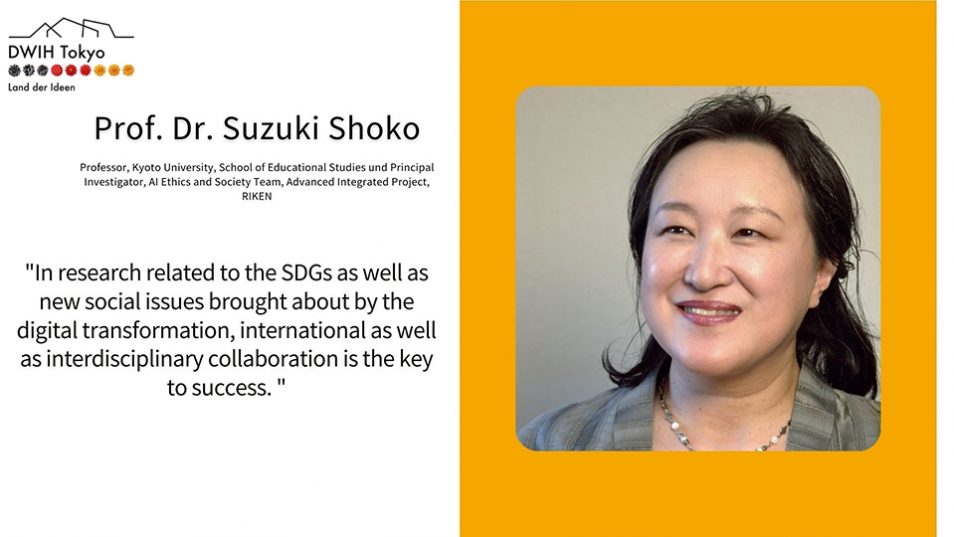Prof. Dr. Suzuki Shoko
 © DWIH Tokyo / Prof. Dr. Suzuki Shoko
© DWIH Tokyo / Prof. Dr. Suzuki Shoko
Our series “Connecting East and West – A Short Interview with …“ presents people involved in German-Japanese research collaborations – and their insights on how and where to cooperate successfully!
This week we welcome Suzuki Shoko, Professor at Kyoto University, Leader of the Artificial Intelligence Ethics and Society Team at the RIKEN Center for Advanced Intelligence, and an expert on the ethics of artificial intelligence.
1. What kind of research makes you excited and why?
I am excited by research that aims to enhance the potential of human capabilities and is not limited to small, specialized areas, but improves human life in a variety of aspects and can be passed on to researchers in a variety of fields. For such research is a way of approaching the unsolved puzzle of the nature of humanity. I have long been researching what I call “another kind of intelligence” that is different from our original understanding of “intelligence” as reason and intellect: Intuition, haptic sense, awareness of your own body, and tacit knowledge. This understanding of intelligence also includes the ability to see moral action and happiness as the path to personal growth as a human being. I believe that this form of intelligence will prove to be of significance in the age of artificial intelligence.
2. What is your connection to Germany?
Over the past five years, I have built new relationships with experts from industry, government and academia in Germany through symposia and joint research on topics such as “The Human Image in the Age of Artificial Intelligence” and “The Future of Smart Cities” as part of the RIKEN project on “Ethics and Society of Artificial Intelligence.” We are now using the project to create even more ways of promoting joint research in Japan and Germany. My personal connection to Germany is based on my studies at the Faculty of Philosophy at the University of Cologne, my work as a news anchor at Deutsche Welle, and my 20 years of field research experience at Freie Universität Berlin.
3. Where should Japan and Germany cooperate more?
I believe that Germany and Japan should cooperate more closely in the field of digital transformation and in developing a fundamental model of artificial intelligence ethics. In Germany, a tradition of thought emerged – especially through Immanuel Kant – that provided the ideological foundation for the modern Enlightenment. By Germany and Japan working together based on this foundation and integrating Western and Eastern philosophy, we can create a social vision for a new era – a “Second Enlightenment” – and thus become world leaders. In this way, we should be able to create the design and ethical foundation for smart cities that are not just another form of an artificial city, but a place where culture truly comes alive through new technologies.
4. What is your winning formula for research cooperation?
In research related to the SDGs as well as new social issues brought about by the digital transformation, international as well as interdisciplinary collaboration is the key to success. It is important that the humanities, social sciences, and natural sciences do not stop at the boundaries of their respective disciplines and focus exclusively on the preservation of their field but cultivate an open and flexible research environment that includes the constant review of fundamental concepts, hypotheses, and methods. This will also have a positive impact on international research collaboration.
5. What advice do you have for German/Japanese researchers looking for joint projects?
In recent years, we have seen a fundamental shift that leads to more interdisciplinary collaboration than ever before. To launch new interdisciplinary projects, I regularly meet online with young researchers from various disciplines such as physics, law, business administration and psychology who live in German-speaking countries – for example, in Berlin, Munich and Zurich. To promote collaborations in the humanities and natural sciences and interdisciplinary research that builds on the strengths of cultural diversity, I would like to invite you to also look to Japan, which has fostered mutual understanding of each other’s way of thinking and values through 160 years of academic exchange. Please feel welcome to contact us about this.
Prof. Dr. Suzuki Shoko
- Professor, Kyoto University, School of Educational Studies und Principal Investigator, AI Ethics and Society Team, Advanced Integrated Project, RIKEN/ Japan
- Graduated from Sophia University/Japan, D.Litt. (Sophia University)
- 7 years of studies at the University of Cologne, 2009/2010 Visiting Professor at the FU Berlin
- 20 years of experience working in German research groups as well as conducting field research in Germany
- Major works: „Auf dem Weg des Lebens – West- östliche Meditation“ (On the path of life – Western-Eastern meditation), Logos Verlag; „Glück der Familie. Ethnographische Studien in Deutschland und Japan“ (Happiness of the Family. Ethnographic Studies in Germany and Japan), Springer; “Takt in Modern Education“, Waxmann; „Der Aufenthalt der ersten japanischen Gesandtschaft im Rheinland. Hintergründe, Verlauf und Eindrücke einer west-östlichen Kulturbegegnungen im Jahre 1862“ (The first Japanese legation’s sojourn in the Rhineland. Background, Development, and Impressions from a West-East Cultural Encounter in 1862.), Deutsch- Japanische Gesellschaft e. V.
Contact:
https://www.riken.jp/en/research/labs/aip/ai_soc/ai_ethical_legal_soc_issues/index.html
suzuki.shoko.5c@kyoto-u.ac.jp
shoko.suzuki.ue@riken.jp
To read other articles related to the DWIH Tokyo Interview, click here.
